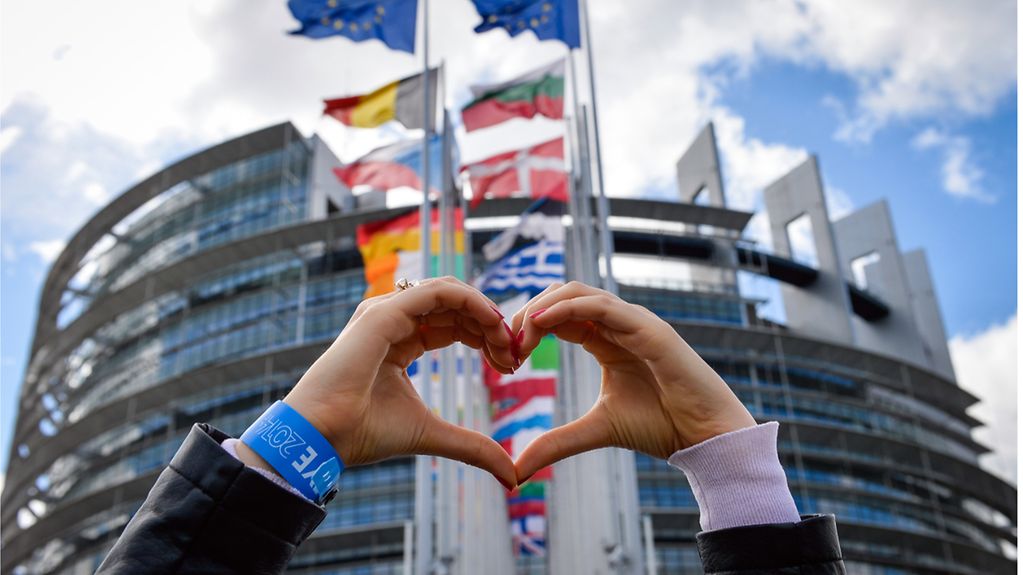Youth exchange
The opportunity to get to know another country, culture and people, learn a new language and develop your skills – this is what many EU initiatives for young people offer. Participation is still possible during the coronavirus pandemic, depending on the situation in the country concerned. Here we present four programmes in more detail.
3 min reading time

Training, collaboration, exchange – this is what the EU programmes offer.
Photo: European Union 2014 EP
Erasmus+
Young people benefit from doing a degree course, semester, internship or youth exchange in another country. All these options are possible under Erasmus+. Not only can this help develop a sense of empathy for other points of view, it’s also an experience to cherish for life. And fun is guaranteed, too.
A semester abroad opens lots of doors to students later on. They can improve their language skills and gain much more independence. Financial support is available for stays of up to twelve months.
As an alternative to spending a semester abroad, Erasmus+ -funded internships abroad are available for young people, too. By gaining insights into other cultures and acquiring new language skills, students can improve their future job prospects. Student internships last a minimum of two months and a maximum of twelve months. For trainees in companies, too, internships are for a minimum of two weeks and a maximum of twelve months.
Erasmus+ also offers the option of a youth exchange. This is open to all young people and can last between 5 and 21 days. Various joint activities are undertaken in groups: role plays, exercises, workshops, debates and much more besides. Participants must be aged between 13 and 30. Only youth organisations and groups can apply for a grant.
See here for details of the programme and the application procedure.
European Solidarity Corps
The European Solidarity Corps enables young people to do voluntary service to promote a socially oriented and diverse Europe: they can work at a children’s home or national park, help restore buildings or take part in recycling workshops, for example. These activities usually take place in a country other than the individual’s country of residence. The projects are an excellent opportunity to provide help where it is needed while acquiring new skills at the same time. And anyone involved is sure to experience unforgettable moments, too. Participants must be aged between 18 and 30. The projects last between two and twelve months.
– For more information on the European Solidarity Corps, see here.
– Here you can read about the experience of Rasmus Conrad, who took part in a European Solidarity Corps programme to help mentally disabled people in Sweden during the coronavirus pandemic.
DiscoverEU
DiscoverEU Travel Passes enable young people to travel across Europe by train. Breathtaking cities, a rich cultural heritage and impressive landscapes make the journey a real adventure. Young people become more independent, discover new aspects of Europe and meet lots of people. 60,000 such travel passesare available this year. To participate, you must be aged 18 and a national of one of the EU member states.
The next round applications is from 12 to 26 October 2021. Once issued, travel passes can be redeemed within ten months. Trips can last anything from one day to one month from the date of departure, and travellers are free to choose their itinerary through Europe.
– See here for details of the application procedure and programme.
– All those who have applied to DiscoverEU can take part in a photo and video competition .
EU Aid Volunteers
Young volunteers can get involved in humanitarian aid projects in various countries through EU Aid Volunteers. Young people support people in areas hit by disaster: activities include day-to-day care and assistance, organising summer camps and helping with economic and social reconstruction.
Participants must be aged 18 and either hold citizenship of an EU countryor a long-term residence permit for an EU country. The period of service can range from one month to 18 months. If an applicant does not have time to do full-time voluntary service, online voluntary service is potentially an option, too. This supports the work done by full-time volunteers.
See here for more information.
Due to the ongoing COVID-19 pandemic, it is very important to check with local authorities about current travel regulations and safety measures in the respective countries before travelling or embarking on a stay abroad.